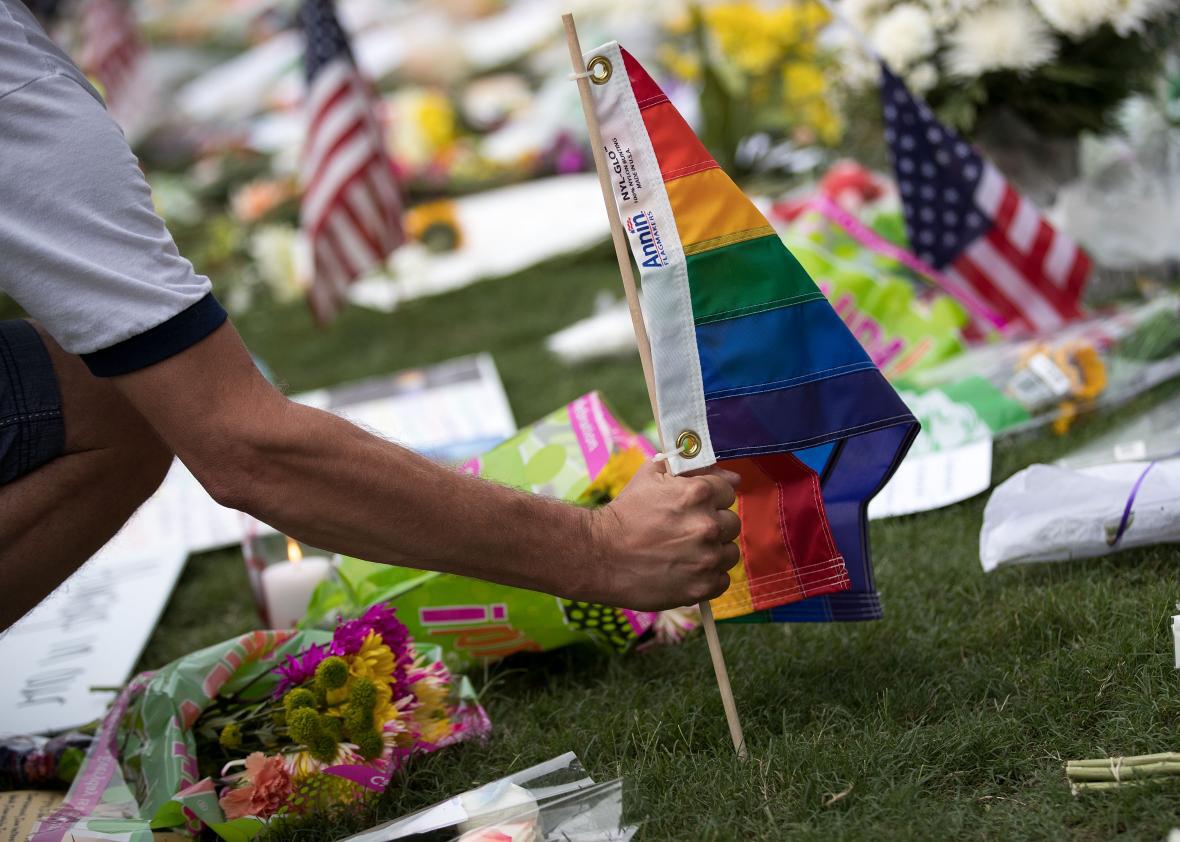There’s no one way to react to the massacre at an Orlando LGBTQ bar Sunday, the deadliest mass shooting in the nation’s history. There is no way, ultimately, to make sense of it. But there may be ways to process and harness our grief and anger that are more—rather than less—productive, and the LGBTQ rights movement itself may contain some of the best lessons for doing so.
The Orlando shooter chose for his harrowing death rampage the Pulse nightclub, where, as President Obama said, sexual minorities “came together to be with friends, to dance and to sing, and to live,” a spot where they felt a sense of safety, belonging, and empowerment to live authentically and push for a better world. The killer, Omar Mateen, found all this unbearable. It was also, whether germane to the killer or not, Latin night at Pulse. This meant the majority of casualties were young, gay Latino men—many of them working service and clerical jobs—making Donald Trump’s barrage of anti-Hispanic comments that much more cruel.
But Mateen’s target was much broader than sexual or racial minorities. Ultimately, his target was an American way of life that celebrates freedom, pluralism, diversity, individual expression, and worldly love—that is, democracy. And so we must use democracy to fight back. It’s true, of course, that there are things to be angry at: Gun control ideologues and profiteers; conservatives and Republicans who have spent years opposing LGBTQ rights and demonizing LGBTQ people; nihilistic thugs who are exploiting a major world religion. But anger is at its most useful when properly harnessed so that we don’t just add to the division, resignation, and even hatred that helped cause the violence in the first place.
The LGBTQ movement has decades of experience harnessing emotions to bring about needed change. At its most effective, our movement made real gains when we came together, told our stories, strategized over the long haul, kept our eye on the ball, and courageously slogged through years of ridicule, violence, and other forms of opposition. And as sentimental as it may sound, we kept at the forefront of our struggle the simple concept that love unites us and is stronger than hate.
Three major lessons from the battle for marriage equality could prove useful at this moment in shaping how we turn anger into action.
First, positive engagement wins more hearts and minds than badgering or shaming people to agree with you. The disruptive LGBTQ activism inspired by anger and agony—particularly during the height of the AIDS epidemic—was critical to forcing the world to take our needs seriously. A fuller measure of equality, however, began to emerge when, through strategizing and storytelling, we appealed to people’s capacity to empathize and understand, when we emphasized points of commonality that made our differences seem smaller than our similarities. The range of things that need to be done in the wake of Orlando—convincing more of the public and our representatives of the need for gun control laws, eradicating anti-gay hostility and public policy, reaching out to disaffected young people of all ethnicities to ensure they feel a sense of belonging—are more likely to be achieved through calm persuasion and by building trust than by berating or demonizing your adversary.
Second, living our authentic lives, visibly and sometimes defiantly, in the face of personal danger and often of hopelessness, ultimately won the day. Since the 1960s, millions upon millions of queer people had the courage to come out and stand up for themselves one person at a time, and by doing so we changed the culture and the world. That’s worth thinking about at times like this, when the world can seem so broken and too large and hateful to heal. Of course, while visibility helped increase LGBTQ acceptance exponentially, it didn’t prevent the Orlando massacre. But that makes LGBTQ visibility more, not less, important. The shooter, who may have been motivated by seeing gay men kiss, or by his own conflicted sexuality, inhabited a world where homophobia was allowed to fester. Making queerness commonplace is an antidote to letting it seem like a threat.
Finally, persistence, sometimes across decades or longer, is crucial to making the world look more the way we want it to. Durable change, the kind which those who are currently your opponents might one day feel invested in, takes time and hard work. Successful gun control measures, for instance, will take not only old-fashioned lobbying, but long-term culture change, something LGBTQ advocates have deftly achieved over the past two generations (and are now considering directly applying to gun control work itself).
So be angry about what happened in Orlando. Let yourself grieve. And then go do something productive. Reach out in sympathy and solidarity with those who need help and understanding, including friends and family who disagree with you. Give money and time to gun control advocacy groups, but also commit to voting in off-year elections, and to never giving your vote to politicians unless they support gun control and LGBTQ equality. Take a stand against reactionary anti-Muslim sentiment in the wake of attacks carried out by zealots. “You got to give them hope,” gay San Francisco City Supervisor Harvey Milk used to say, even as he suspected he would be gunned down for taking a stand. Having the courage to have—and to spread—hope and love in the face of despair, hatred, and death has never been more important.
